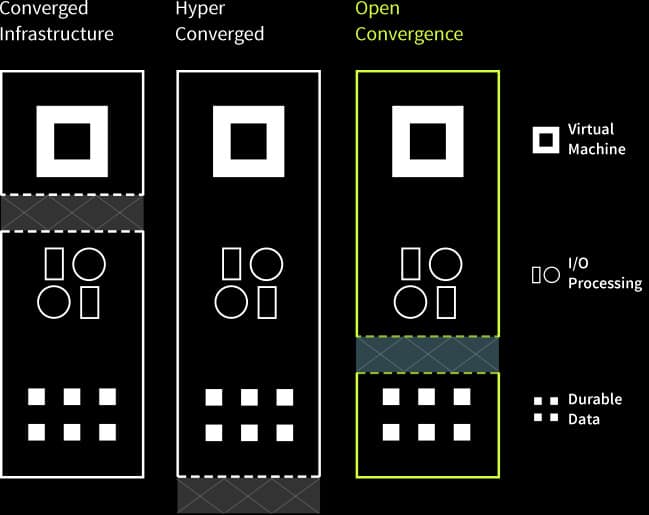Today Datrium made two new announcements today. Its new suite of scalable, secure cloud data management tools (that, of course, is integrated with its Datrium DVX Open Convergence platform), Data Cloud Software. Datrium also is announcing its new turnkey system nodes for virtualization administrators to speed infrastructure deployment and simplify end-to-end support, DVX Rackscale systems.

As private clouds are seeing a higher adoption rate within enterprises, especially for webscale and tier 1, Datrium is seeking to simplify the process of deploying these clouds with the introduction of its DVX Rackscale systems. The new system combines DVX Data Nodes with the new DVX Compute Nodes. These new compute nodes are available with either 16 Core Intel Xeon E5-2620 v4 2.1GHz processors or 28 Core Intel Xeon E5-2680 v4 2.4GHz processors, and pre-configured with up to 768GB RAM, 8 SSDs and DVX Software. DVX Rackscale starts with one compute and one data node and can scale-out to 32 compute nodes per data nodes. DVX Rackscale offers automatic performance isolation, robust security, and accommodates mix-and-match of DVX Compute Nodes with third party compute nodes running DVX Software.
Simplification goes out the window if configuring the network becomes overly complicated. Datrium is addressing this as well with its innovative Adaptive Pathing software, included with its systems. According to the company, its end-to-end path awareness, top-of-rack switches no longer need settings such as LACP or MC-LAG for advanced multipath availability and link-aggregated bandwidth. In fact they take it a step further and state that there is no need for configuration settings as it will always be on.
Continuing the message of simplification, Datrium Data Cloud software builds off of Datrium’s Open Converged Infrastructure to, according to Datrium, further collapse the systems administration burden of legacy data management products common to SANs and traditional converged infrastructure. The Data Cloud software takes Datrium’s platform and extends it into functions one would normally find in third party backup, DR, copy data management and archiving products.
Features of Data Cloud Software include:
- Dynamic Policy Management for VM-based Data Management: Datrium Protection Groups dynamically bind arbitrary collections of VM, vDisk and file (e.g. templates, ISOs) objects and apply scheduling, retention and replication policies. A Protection Group can include any quantity of objects and even supports overlapping objects with other Protection Groups. Finally, all objects within a Protection Group can be snapped at the same IO moment across hosts for data consistency. To scale, protection group policies are dynamic and inherit all new VMs that fit naming wildcards.
- Copy Data Management for DevOps: In one click or a simple CLI script, VMs can be cloned from existing or snapshot VMs or PGs. Test environments can be quickly cloned from full production builds with minimal capacity and without performance impact, accelerating software development and improving the quality of the result.
- VM-Centric Backup and Restore: Based on Datrium redirect-on-write (RoW) snapshots, backups are granular (vDisk and file level), incorporate dynamic policy management, and include a searchable catalog called a Snapstore. A Datrium system can support hundreds of thousands of VM snapshots. LUN-snap-style browsing for recovery can’t work at this scale, so a Snapstore catalog provides simple, quick searchability.
- Disaster Recovery (DR) and Offsite Archiving: Based on Datrium’s WAN-optimized Elastic Replication, production data can be protected with snapshot–based asynchronous replication capable of providing up to 48 recovery points per day per Protection Group. Replication performance scales elastically with the number of hosts configured. Minimal host overhead is required since only data-reduced snapshot deltas are sent from host flash. Elastic Replication is also fault-tolerant. Unlike HCI-based replication, which stops if a small number of hosts are down, Datrium replication continues even if only a single host remains online. The software also supports 1-to-many, many-to-1, and bidirectional replication topologies.
- Secure Public Cloud Archiving: In a subsequent version of Data Cloud, the company will offer replication to Amazon Web Services (AWS). Based on Elastic Replication, this flexible, secure cloud-based archive will leverage the same on-wire data reduction as well as Blanket Encryption for end-to-end data security between private and public cloud data centers.
Availability and Pricing
Data Cloud Foundation, Elastic Replication, Blanket Encryption, and DVX Rackscale Systems are all available today. Data Cloud Foundation, Elastic Replication, and Blanket Encryption are available at no additional charge for DVX system customers that are running DVX Software v2.0. DVX Rackscale systems start at $118,000, they will include Datrium v2.0 software, and end-to-end Datrium Support, which provides advanced 24×7 call home and analytics capabilities.
Elastic Replication support for Secure Archiving to AWS is expected to be available by March 2018, with pricing to be announced at that time.




 Amazon
Amazon